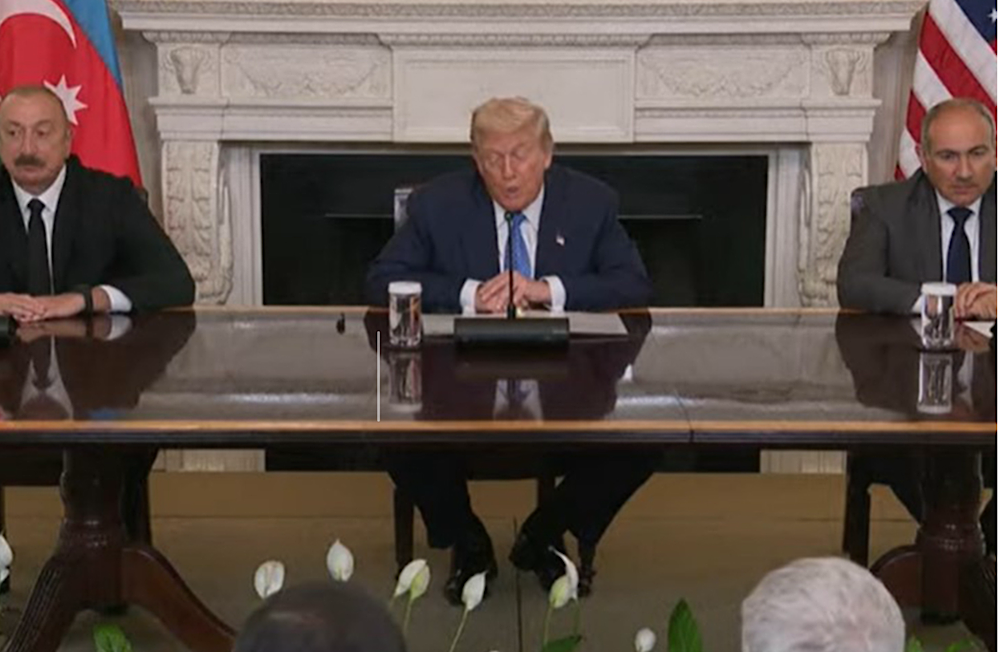A suspended peace between Armenia and Azerbaijan
The Washington meeting confirmed the role of the US as mediator in place of Russia. Many issues remain to be resolved, including the international disputes between Yerevan and Baku, borders and prisoners. But the central issue is the opening of the so-called ‘Zangezur Corridor’, renamed the ‘Trump Corridor’ and under US control. The challenge for the Armenian Church.
Moscow (AsiaNews) - The meeting in Washington between the leaders of Armenia and Azerbaijan, Nikol Pašinyan and Ilham Aliev in front of Donald Trump, produced a statement signed by the two with some points that envisage the ‘finalisation’ of the text of the peace agreement, agreed months ago and still to be signed, with a series of legal and territorial conditions, effectively placing the US in Russia's place in the role of mediator between the two Caucasian countries.
The term used to complete this commitment is the ambiguous “paraffinisation” of the text, in the sense of its completion and “solemnisation”, to finally end a conflict that began in 1992 over control of Nagorno-Karabakh.
There are still many issues to be clarified, starting with the dissolution of the OSCE Minsk process with all its structures still formally active and chaired by the US, France and Russia, the rejection of the international lawsuits filed by Yerevan and Baku against each other, the definition of borders, the exchange of prisoners and assistance to refugees.
The real substance of the American meeting, in fact, is also the most important and decisive issue from an economic, even more than a political, point of view, and concerns the opening of the so-called “Zangezur Corridor” to link Azerbaijan to its enclave of Nakhchivan, located entirely in Armenian territory.
Until the first joint draft of the peace agreement at the beginning of this year, after endless previous negotiations, Aliyev had no qualms about assuring that “we will use force if necessary” to reopen this channel of communication, which was active in Soviet times and had been blocked by subsequent conflicts.
In the text signed in Washington, this 42-kilometre space in the Armenian region of Syunik is now referred to as the “Trump Corridor for Peace and International Development”, an excellent premise for winning the much-coveted Nobel Peace Prize, one of the most sought-after symbolic goals of the American president.
The infrastructure needed to reactivate communications will be entrusted to private American entrepreneurs, under the direction of the White House, effectively cutting Russia off from control of the South Caucasus.
For now, there are no comments from Moscow on this very unfavourable prospect for the Russians, who have been in high tension with the Azeris for many months now. With American protection, Baku is placing itself at the centre of trade routes and, above all, energy exports, which it could previously only carry out through Russia.
Armenia also aspires to reopen communications with the East and West, given that its borders with Turkey were blocked due to the war with the Azeris, who are supported by the Turks. Now Yerevan is re-establishing relations with Ankara, and the Corridor could also open the doors to Asia, via Azerbaijan itself.
Pašinyan has been pursuing this line of peaceful settlement for some time, but he also has to contend with strong pro-Russian opposition within the country, which includes all former presidents and even the leaders of the Apostolic Church, starting with Catholicos Karekin II, whom the prime minister wants to replace with a “more worthy” figure, having also imprisoned several bishops and priests on charges of “attempted coup” supported by the Russians.
For this reason, one of the points of the agreement that must be clarified is the claim to Armenia's territorial integrity, for which Azerbaijan is even calling for a change to the Armenian constitution.
Pašinyan has repeatedly stated that the text should not be understood as conflicting with Azerbaijan, leaving the matter in the hands of the Constitutional Court in Yerevan. Peace between the two former Russian colonies in the Caucasus remains effectively suspended, against a backdrop of geopolitical strategies and other major conflicts, starting with Ukraine, where the interests of the US, Russia, Turkey, China and Europe clash.
24/10/2019 17:56







.png)










